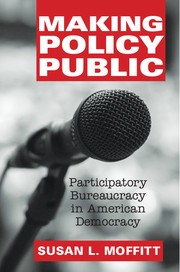Book contents
- Frontmatter
- Dedication
- Contents
- List of Figures
- List of Tables
- Preface
- Abbreviations
- 1 Portals of Democracy in American Bureaucracy
- 2 Participatory Bureaucracy in Practice
- 3 The Development of Public Committees
- 4 Making Educational Performance Public
- 5 Private Knowledge for Public Problems
- 6 Setting the Public Agenda
- 7 Deliberate Participation
- 8 The Impact of Public Advice
- 9 Participatory Bureaucracy in American Democracy
- Appendix
- Bibliography
- Index
- References
4 - Making Educational Performance Public
Reporting on the Progress of Education
Published online by Cambridge University Press: 05 October 2014
- Frontmatter
- Dedication
- Contents
- List of Figures
- List of Tables
- Preface
- Abbreviations
- 1 Portals of Democracy in American Bureaucracy
- 2 Participatory Bureaucracy in Practice
- 3 The Development of Public Committees
- 4 Making Educational Performance Public
- 5 Private Knowledge for Public Problems
- 6 Setting the Public Agenda
- 7 Deliberate Participation
- 8 The Impact of Public Advice
- 9 Participatory Bureaucracy in American Democracy
- Appendix
- Bibliography
- Index
- References
Summary
If it could be published annually from this capital through every school district of the United States that there are states in the Union that have no system of common schools ... It would shame out of their delinquency all the delinquent states.
Representative James Garfield, (R-OH), 1866The purpose of this letter is to invite you to a small unpublicized conference on methods for assessing the level of educational attainment in the United States. This conference is being sponsored by the Carnegie Corporation with the cooperation of the United States Office of Education.
Letter to Ralph Tyler from John W. Gardner, November 7, 1963Within the vast terrain of federal level public committees, when do different forms of participation emerge, and what are their implications for bureaucratic administration and democratic accountability? The themes of decentralization and exclusivity that characterized debate over the development of public committees in the twentieth century manifested in participatory processes related to the collection and use of educational statistics and assessments. Looking closely at the development of public committees for educational assessments also reveals variation in the conditions yielding different kinds of participation, as expected. The field of education statistics and assessments allows us to look at a wide spectrum of public participation – from unpublicized participation in nongovernmental venues to commissions composed of nationally prominent individuals to panels of parents and educators to committees consisting of conventionally defined technical experts. Some of these committees have offered only advice. Others have been empowered to make policy. Through this variation, the field of education statistics and assessments gives witness to the limits of the Federal Advisory Committee Act. Not all venues for participation in operation after 1972 fall under the auspices of FACA: institutional explanations take us only part of the way in understanding the emergence, use, and impact of participatory processes.
Reflecting the general terrain of American federal public committees, public committees for education statistics and assessments emerged initially from executive branch initiative, though they have not always been under executive branch control. As task conditions vary – more/less agency task expertise, more/less agency task jurisdiction – so too have the forms that participation has taken, ranging from private learning, to promoting executive branch policy, to public educating, to developing new knowledge.
- Type
- Chapter
- Information
- Making Policy PublicParticipatory Bureaucracy in American Democracy, pp. 82 - 111Publisher: Cambridge University PressPrint publication year: 2014



